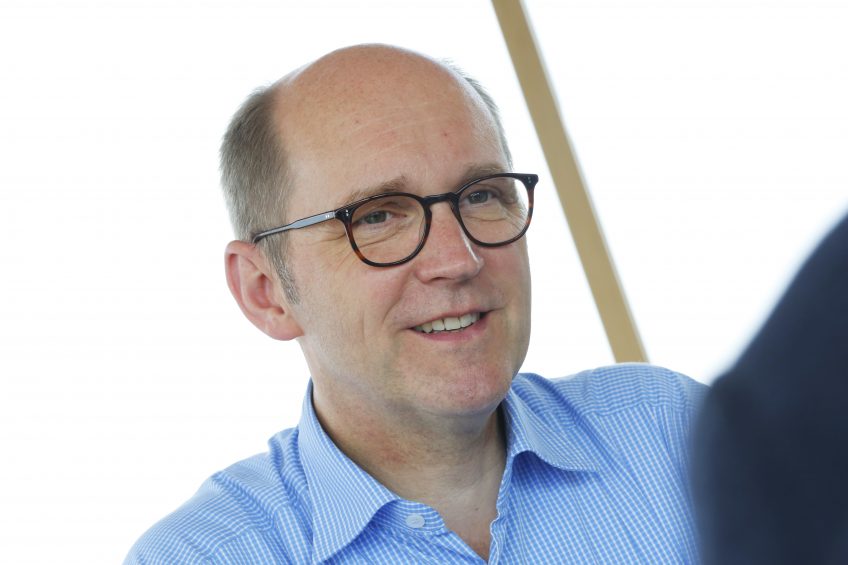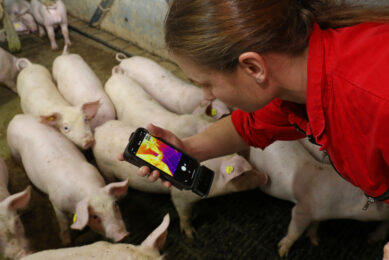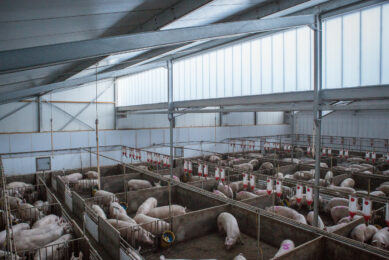Big Dutchman’s CEO: Always looking for creative solutions

Soon, Bernd Meerpohl will attend his 14th edition of EuroTier as CEO of Big Dutchman. Ever since he took office in 1992, the German company has grown explosively. As always, the company has had a strong focus on innovations – and where better to show them than this November’s EuroTier in Hanover? Pig Progress has a look ahead with Mr Meerpohl.
Is it new? Is it old? In the heart of the Big Dutchman campus in Vechta-Calveslage, Germany, a large, somewhat puzzling warehouse can be found, in use as a display hall for all of the company’s innovations. With cast iron pillars and framework, the spacious showroom exudes the atmosphere of a19th century, industrial facility – yet the modern glass panes on the outside suggest a more recent origin. When was it built? Only recently, says Bernd Meerpohl with a smile. He is the man who had a decisive share in the design of the building. After all, architecture is one of his passions.

Even in the function as CEO of Big Dutchman, the work of Mr Meerpohl has the features of being a builder, a creator, a constructor. Not that he always aspired to that role – he started out wanting to have his own Mercedes business. His father Josef Meerpohl, however, the previous owner of Big Dutchman, introduced young Bernd to a much more versatile business to work for: that of the livestock industry. Ever since the son took over in 1992, the company has expanded rapidly, in market share, in geographical spread and in revenue. Currently, almost 3,500 people work at the company, at various offices in all continents.
Especially around EuroTier, Mr Meerpohl’s creative influence is easy to distinguish. Many Big Dutchman staff work hard to be present in Hanover with a wide range of innovations. The year 2018 is no exception with at least 8 novelties for swine. 2 of them received a silver medal; likely most attention will go to ‘Xaletto’, a new housing concept that substantially improves air quality in pig houses, increases animal welfare and reduces the amount of slurry.
|
Pig Progress: What is the philosophy behind Xaletto?
Bernd Meerpohl: “We have a huge manure problem here in Germany, and I believe that Xaletto can be a first step in addressing not only this problem, but also air quality and animal welfare issues. In doing this, we follow society leads, also regarding more sustainability. We cooperated with the renowned feed producer Bröring from Dinklage, near Vechta.
“Xaletto is an economic solution, as proven by the 6,000 animal places for which it has already been successfully implemented for quite some time. Moreover, we have already concluded about 10 contracts for an additional 40,000 animal places to be equipped with Xaletto – even before the system will be presented at EuroTier. Xaletto is definitely not a niche product, but something new and groundbreaking – an interesting concept in which piglets and finishing pigs are kept on straw.”
What role does Big Dutchman play? After all, anybody could stack pigs in a house with straw.
“There is quite a bit of know-how involved. We have learned that we need a specially developed feed type, and we have added a few products, such as a special ventilation control, an adapted drinking system, and modified feeders. A robot takes care of the bedding, so straw handling is less labour-intensive. We created an entire concept – and of course the penning needs to be adapted so that cleaning is easier once the pigs have been moved out.
“Big Dutchman has collaborated with the system’s inventor, a hands-on professional, and Bröring, for several years.”
Now, it’s easy to get people enthusiastic about straw and it is always easy on the eye, isn’t it?
“You are right. We have a video where one employee throws some new straw into a pen, making the piglets run around like crazy, rooting and playing with the straw all day long. It’s great to see such happy animals.
“A representative from a big supermarket chain, responsible for animal welfare, also visited the trial barn. It took him just 2 minutes to say: ‘Very good… I am astonished.’”
The system is aimed at improving air quality. That goes against your business to sell air cleaners.
(smiles) “That actually is the one point I am frustrated with, because e.g. the ammonia levels are so low in the pig house. Our partner Mr Bröring always laughs at me, saying: ‘I will take your business away.’ Then I say: ‘The better is always the enemy of the good, so I am fine with that.’”
Lower ammonia levels are also good for the pigs. How important is animal welfare for you?
“We definitely have welfare very high on our agenda when we design new products. Of course we sell our products all around the world, so the need for welfare is quite different from place to place, and I understand that. Honestly speaking, I wouldn’t want to make the choice between giving people in Asia the chance to buy affordable food or ensuring probably excessive animal welfare ideas.”
The goal should be to make sure that animal welfare does not go at the expense of productivity.
“Exactly. Sustainability is important. We need to feed potentially 9 or 10 billion people in only a few years’ time. That’s why we have to be economically efficient and effective, but we always need to keep animal welfare and changes in society in mind as well. With Xaletto, we have managed to do just that, I think.”
What is your vision for 2050, with over 9 billion people on this planet? Will we be able to feed them all?
“I think so, but it will be a big challenge. Efficiency and effectiveness are very important. I strongly believe that mankind is intelligent enough to solve its self-created problems. It’s one of my credos; I think about it every morning when I wake up. It is why I wake up, why I go to work early, and why I am pushing so hard for Big Dutchman to solve the problems created by mankind.”
How important is smart farming for Big Dutchman?
“Very important. We are putting a lot of money into it. Digitalisation is our innovation driver. We were the first in the industry to launch a farm management and control system (BigFarmNet) that unites all applications on a farm in one software and one database. We now need to take the next step and connect all of this with big data to allow farmers to benchmark their results with other producers’ data in real time.
“We have founded a company in Denmark specifically for these kind of issues. The only thing is, and now I’m talking entirely against the trend, that it will take much more time than everyone believes to figure out something intelligent. Because getting the data is one thing, making them reliable is another thing, and really drawing the right conclusions, is yet another thing.
“See it this way: You can have tonnes of data and you can have tonnes of information, but we are talking about animals here. Big data will help us eventually, but it is not a quick fix.”
What does EuroTier mean for Big Dutchman?
“For me it is the world’s number 1 show for livestock production, no doubt. The DLG (show organiser, VtB) are interested in new products, they are interested in the farming community. They look very professionally at what is good for the farmers and what is good for our industry as such.
“I do believe the number of both farmers and farms here in Europe is decreasing, which is why I think that there will also be a reduced number of exhibitions in Europe eventually. The top 1 or 2 shows may not grow in number of visitors, but they will grow in importance for this reason.
“What will keep us in business in Germany is that we are the world’s drivers for technology, animal welfare and sustainability. Big Dutchman wouldn’t be as successful without the farmers in Germany, the Netherlands and Denmark keeping us on our toes, pushing us every day with new ideas. From my point of view, they are helping reshape the world. All European customers are drivers for innovation and helping us bring that into the world.”
Say 20 years from now, you start planning to retire. What kind of company would you like to leave behind?
“I would like Big Dutchman to have grown further, to be the number 1 in layers, broilers and pigs. I would also like to explore new ideas with which we look at different ways of feeding the world. And I want to leave behind a respected company that is a good partner of the industry, for our customers, our related industries and even our competitors – a serious and competent partner they can rely on. And if this legacy would remain in the hands of the Meerpohl family, that would be even more fantastic for me.”
At EuroTier, Big Dutchman’s main booth can be found in hall 17, B21. A second booth is in hall 26, C28.
From the USA to GermanyBig Dutchman was founded in Holland, MI, United States in 1938. The company, initially focusing on automatic feeding systems for poultry, found a sales agent for the German market in Josef Meerpohl in 1958. Through a management buy-out, he even acquired the entire company in 1985, effectively moving the company’s headquarters to Vechta-Calveslage in Germany. Currently, the company focuses on the production of equipment for layer hens (about 50% of the turnover), swine (25%) and broilers (25%). The majority of turnover is made in Europe and Russia – about 40%. Asia is responsible for 30%, the Americas for 20%, and the remaining 10% comes from the rest of the world. In 2017, the company had a turnover of almost € 900 million. Worldwide, Big Dutchman has 30 subsidiaries and 200 agencies in 80 countries. |


 Profile
Profile








